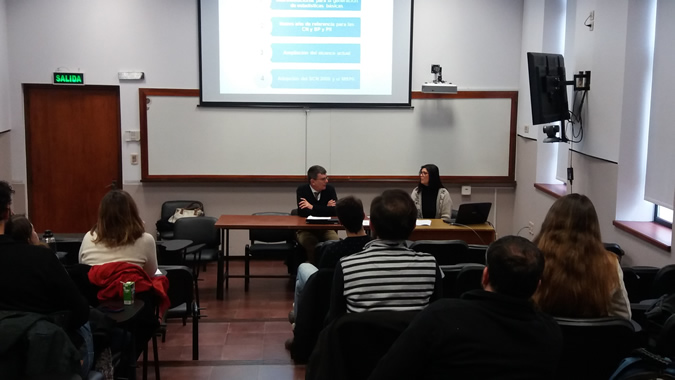Public Officials from Uruguay Receive Training on National Accounts and Social Outlays
Work area(s)
The course was organized by ECLAC’s office in Montevideo, in the framework of an agreement with that country’s Ministry of Social Development.

Public officials from diverse entities in Uruguay participated, from June 11 to 14, in a course about National Accounts and Social Outlays organized by the office of the Economic Commission for Latin America and the Caribbean (ECLAC) in Montevideo in the framework of a cooperation agreement with that country’s Ministry of Social Development.
The course was led by ECLAC’s Regional Adviser on Economic Statistics, Federico Dorín. His objective was to train participants in the measurement of social outlays based on information from the national accounts system, incorporating not just information from the public sector but also from the private sector.
The course’s analysis of social outlays delved into the treatment of the government’s social security systems and of defined contribution social welfare pensions.
In addition, it addressed non-pension-related benefits, governmental social assistance and the analysis of consumption from its two angles: expenditure and effective consumption, both for households and for the government and non-profit institutions that serve households.
Participants engaged in practical exercises on data recording and discussed the necessary requirements for compiling a social investment satellite account. In that sense, it was emphasized that a first point to be clarified is the scope of the concept “social” to then advance on outlays, and the redefinition of “investment” as it is addressed in the central framework of national accounts. This element also requires a debate and subsequent international consensus.
The course included a guided reading through the National Accounts System, in particular the Integrated Economic Accounts and the institutional sectors, with special emphasis on the Households and General Government sectors. In the case of households, the analysis focused on the existing differences in income and expenditure measurements done in household income and expenditure surveys and the institutional Households sector of national accounts.
The course also focused on the definition and coverage of the informal sector of households, informal employment and the non-observed economy, highlighting their places of intersection and differences, since they are often used erroneously as synonyms.
ECLAC’s Manual Estimating Social Outlays based on the National Accounts System, published in 2016 only in Spanish, was used as the reference for recording social outlays.
Presentations were also made on the social accounting matrix, citing as an example the case of Ecuador with a perspective of analysis and simulations in the style of an input-output matrix.
Related content
Subregional headquarter(s) and office(s)
Type
Country(ies)
-
Uruguay
Related link(s)
Related project(s)
Contact
ECLAC Office in Montevideo
- cepalmontevideo@cepal.org
- 25 de Mayo 745 Piso 2